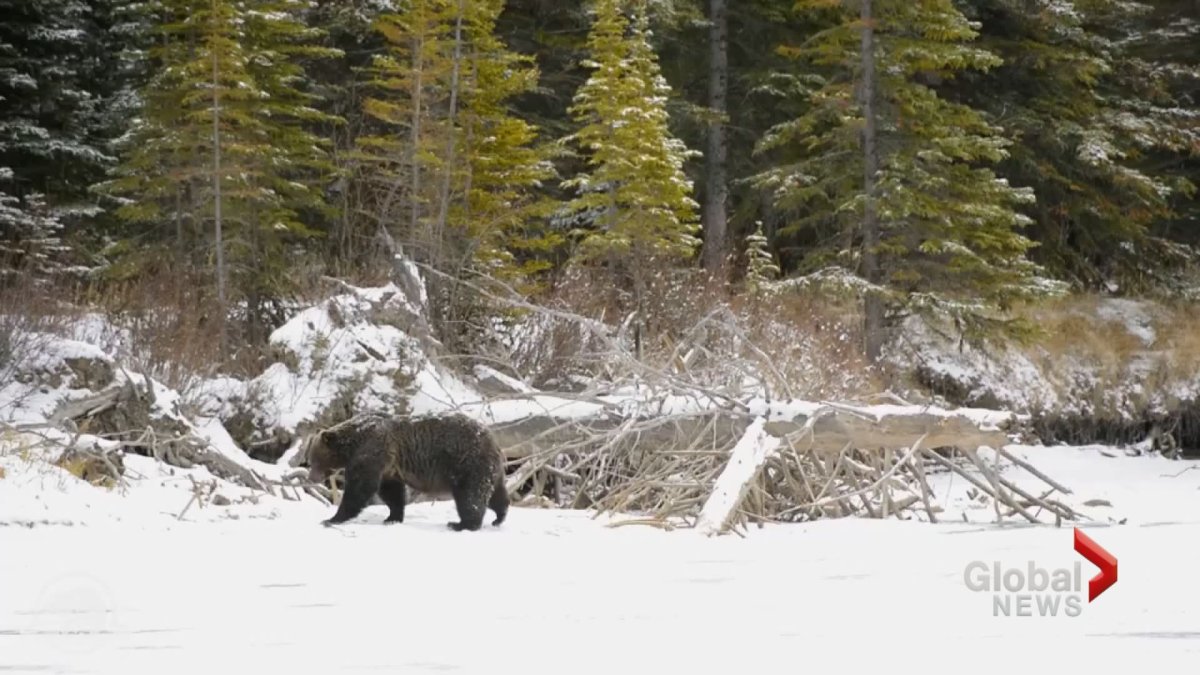It’s a tell-tale sign that spring is on its way: hungry bears waking from a deep sleep to venture out and find something to fill their empty bellies.

And in Banff, that sign came a little earlier than normal for 2020, as the first bear awake from hibernation was spotted on Feb. 29, according to Parks Canada human-wildlife co-existence specialist Blair Fyten.
Another Parks Canada staff member encountered the large grizzly while doing corridor track monitoring near the Sunshine Village Ski Resort, close to the valley bottom, Fyten said.
“For our area, it’s generally a little bit earlier given the warm temperatures… when I look at the forecast moving forward here, it’s been warm all this week since we’ve sighted him and it’s going to stay relatively warm,” Fyten said, adding it’s not surprising the bear is on the move considering the mild temperatures.
“I really don’t think this bear is going to go back into his den. He’s probably going to cruise around in the valley bottom and try to scavenge up some food.”
Last year, the first bear sighting was on March 19.
Fyten said officials believe this bear is one of the well-known larger males, possibly bear 122 or 136 — also known as The Boss and Split Lip — but they don’t know for sure.
“They’re usually the first bears to show up in the valley here for us,” he said.
Considering there’s still a considerable amount of snow on the ground, Fyten said the bear will still have a challenge ahead of him when it comes to putting on weight ahead of the spring.
“Unless this bear comes across a substantial carcass that’s got quite a lot of meat left on it or protein, they are still losing body weight for a while because the snow is quite deep and it’s hard for them to get around. So their net intake is probably less than the energy they’re expending,” he explained.
“Potentially he’s still losing weight for the next six weeks or so, or two months, until we start getting some green happening and there’s a better food source for him.”
Fyten said the bear will likely make its way toward the train tracks in search of food, such as the carcass of an animal that was hit by a train or spilled grain, which is somewhat concerning.
“These bigger bears that tend to travel the tracks there are quite rehearsed as to when to get off the tracks in time before the train goes by,” Fyten said.

Fyten said Parks Canada works with CP Rail so if a train does hit an animal, they let officials know so they can go investigate and if there is a carcass on the tracks, they’ll drag it into the woods so it doesn’t attract any other carnivores to the dangerous tracks.
Fyten said while it’s still winter and people might not be thinking they’ll bump into a hungry bear this time of year, it’s important they take the proper precautions for a possible encounter.
“Typically by the end of March, we start to have some of the other big males come out,” Fyten said.
“The females tend to stay in the den for a little longer and we’ll start seeing them in mid-April, towards the end of April — they just don’t have the same fat reserves some of these bigger males do, so they conserve their energy by staying in the den, especially if they have newborn cubs that they’re nursing.”
He said people should travel in groups, make a lot of noise and dig their bear spray out of their closets and start taking it with them whenever and wherever they go in the mountains.
If anyone does encounter a bear, they’re encouraged to report the sighting to Banff dispatch, which is open 24/7, at 403-762-1470.
- Ontario First Nation declares state of emergency amid skyrocketing benzene levels
- Singh mulls TikTok return as U.S. nears potential ban over security fears
- More financial institutes are offering crypto-services, survey shows
- Possible TikTok ban in U.S. looms after Biden signs bill, setting up legal fight




Comments